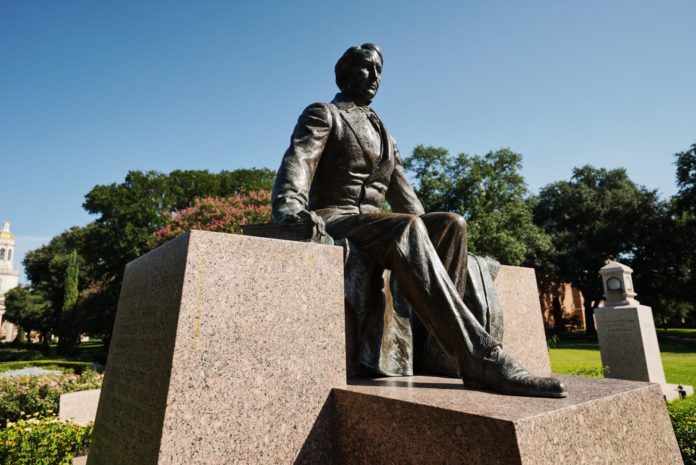By Ava Dunwoody | Staff Writer
The Commission on Historic Campus Representations is working to respond to the Black Lives Matter movement at Baylor University. The purpose of the commission, announced on July 6, is to research Baylor’s ties to injustice and form a proposal to be deliberated by the university.
Members of the commission were appointed based on their ability to contribute to the group, including their unique perspectives, expertise in diversity and historical research and different positions throughout campus. The 26 members and three co-chair commissioners include students, faculty, staff and alumni who were named in a press release published by the university.
“The Commission will develop a set of observations for consideration by the Board of Regents and Administration about how to best communicate and reflect the complete history of Baylor University for current and future generations,” the press release said.
The commission has specifically been charged with a four phase action plan. The first step is a discovery phase, where they will review historical records in the context of the university and its founders in depth.
Second, they will propose a plan for documenting and communicating the complete history of the university to the public.
Third, the commission will evaluate the original intention behind statues, building names and monuments on campus to provide observations for consideration.
Finally, they will prepare a final report for the Board of Regents by Dec. 20. The commission will then be dissolved.
Baylor’s NAACP chapter has been particularly involved in holding Baylor accountable regarding their response to the state of the nation. Shevann Steuben has been the president of Baylor NAACP since 2018 and serves as president of Texas NAACP Youth & College Division.
“I know some really great people that are on [the commission],” Steuben said. “I have no doubt that those voices will speak up for not just Black voices, but minority voices.”
On June 2, Baylor NAACP published a letter to Baylor to Baylor titled “We Are Done Waiting” in tandem with the NAACP’s national campaign “We Are Done Dying” in which they urged the university to respond. The letter outlined Baylor NAACP’s frustrations with Baylor’s lack of statement and support.
“We restlessly await Baylor University’s active stance on hate, racism, and police brutality,” Baylor NAACP said. “The time is now!”
Twenty-four days later, on June 26, the Board of Regents made a statement acknowledging Baylor’s historical ties to slavery and the Confederacy. The Commission on Historic Representations was created as part of that resolution
The commission is the first action step following the Board of Regents’ statement about the university’s ties to racial injustice. It was developed to start the process of reviewing Baylor’s history and proposing changes as needed, but it will ultimately be up to the Board of Regents to decide what will be implemented.
“A lot of people immediately thought this was … revisionist history,” said Dr. Mia Moody-Ramirez, chair of journalism, public relations and new media and a member of the commission, said. “But it’s not a matter of us trying to go in and rename Baylor or remove statues. It’s a matter of us evaluating this history and then coming up with a plan.”
Steuben said while the Baylor NAACP thinks the commission was “definitely needed” and is a “positive” first step, she hopes that Baylor digs even deeper than its past.
“If we are going to say this commission is just for the history, we also have to deal with the present,” Steuben said. “If you don’t want this commission to have to happen again in 20 years … then you need to address what the concerns are on campus now.”
In a Baylor Conversation Series Online video entitled “Our Responsibility as Christians to Elevate Conversations on Race, Peacemaking and Conciliation,” President Linda Livingstone addressed Baylor’s hopes on finding common ground.
“It certainly took us many years to get to the point we are at on these issues of race and injustice, and it will probably, unfortunately, take us many more years to reach a stage of reconciliation,” Livingstone said. “We have the opportunity to take a huge leap forward that could shorten that timeline significantly to get to true conciliation.”
The commission is still in its early stages and their meetings will continue throughout the semester. Until they release an official statement of their progress and development of their plans in late October, the commissioners have postponed further insight or comments.
“I know we will do what we have been asked to do,” Moody-Ramirez said. “Now what will be done with the final product—which is the report—that part is yet to be seen.”






